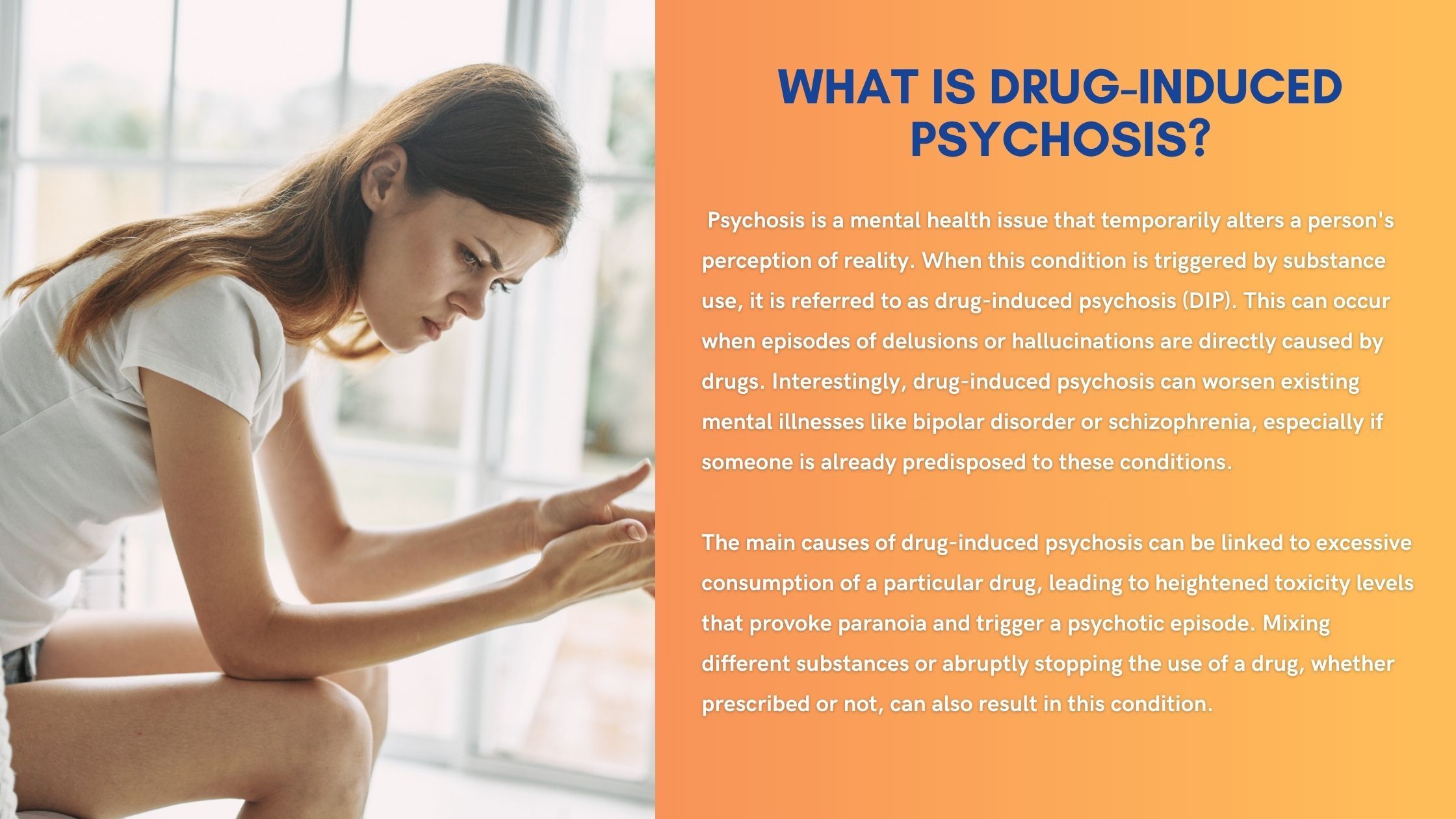In a world where substances are prevalent, the consequences of drug misuse can extend beyond physical health, affecting mental well-being as well. Drug-Induced Psychosis is one such consequence, a condition where the use of certain substances triggers psychotic symptoms. This article aims to unravel the complexities of Drug-Induced Psychosis, exploring its definition, causes, symptoms, and potential pathways to recovery.
Defining Drug-Induced Psychosis
Psychosis is a mental health issue that temporarily alters a person’s perception of reality. When this condition is triggered by substance use, it is referred to as drug-induced psychosis (DIP). This can occur when episodes of delusions or hallucinations are directly caused by drugs. Interestingly, drug-induced psychosis can worsen existing mental illnesses like bipolar disorder or schizophrenia, especially if someone is already predisposed to these conditions.
The main causes of drug-induced psychosis can be linked to excessive consumption of a particular drug, leading to heightened toxicity levels that provoke paranoia and trigger a psychotic episode. Mixing different substances or abruptly stopping the use of a drug, whether prescribed or not, can also result in this condition.
Delusions and hallucinations are key characteristics of psychosis. Delusions involve holding irrational beliefs even when faced with evidence to the contrary. On the other hand, hallucinations manifest as intense sensory perceptions of things that aren’t real. This can include vivid feelings, sights, smells, or sounds that do not actually exist.
By understanding the causes and symptoms of drug-induced psychosis, we can better equip ourselves with the knowledge needed to address and support those struggling with this condition.
Understanding the Causes of DIP
- Substance Type Matters: Different drugs can induce psychosis, with stimulants like methamphetamine or hallucinogens like LSD being notable culprits. Understanding the specific substances involved is crucial in addressing the condition.
- Dose and Frequency: The dosage and frequency of drug use play a pivotal role. High doses or chronic use can overwhelm the brain’s delicate balance, paving the way for psychotic symptoms.
- Individual Susceptibility: Not everyone who uses drugs will experience Drug-Induced Psychosis. Factors such as genetic predisposition or pre-existing mental health conditions can increase vulnerability.
Recognizing Symptoms of Drug-Induced Psychosis
- Hallucinations: Similar to Alcohol Induced Psychosis, drug-induced episodes can involve hallucinations, where individuals perceive stimuli that aren’t present.
- Paranoia and Delusions: The use of certain substances can fuel paranoia and delusions, leading individuals to harbor irrational beliefs or suspicions.
- Impaired Thinking: Drug-induced psychosis often results in disorganized or confused thinking, making it challenging for individuals to process information coherently.
- Mood Swings: Fluctuations in mood, from extreme elation to deep despair, are common during episodes of drug-induced psychosis.
Diagnosis and Treatment
- Medical Assessment: Diagnosis involves a thorough medical assessment, taking into account the type of substance used, the individual’s medical history, and observed symptoms.
- Medication: Depending on the severity of symptoms, antipsychotic medications may be prescribed to manage the psychotic features. This should be done under close medical supervision.
- Therapeutic Interventions: Psychological therapies, including cognitive-behavioral therapy (CBT), can help individuals understand and manage the underlying issues contributing to drug misuse and psychosis.
- Inpatient Care: Severe cases may require inpatient treatment to provide a structured environment for detoxification and psychiatric care.
Recovery Strategies
- Professional Guidance: Seeking help from healthcare professionals or specialized treatment centers is crucial. They can provide the expertise needed for a comprehensive recovery plan.
- Addressing Underlying Issues: Delving into the root causes of substance misuse, including potential mental health concerns, is essential for sustained recovery.
- Building Support Networks: Establishing a robust support system, including friends, family, and support groups, can be instrumental in navigating the challenges of recovery.
The Effects of Drug Induced Psychosis
Drug-induced psychosis is a serious complication that can have significant consequences for the affected individual and their families. It is essential to seek professional help if you or a loved one is experiencing symptoms of psychosis associated with drug use. Effective treatment is available, and recovery is possible with the right support and interventions. Remember, you are not alone, and there is hope for a better future.
Drug Addiction Recovery in Asheville, NC.
If you or someone you know is grappling with the complexities of drug-induced psychosis or struggling with substance misuse, Crest View Recovery Center is here to help. Our compassionate team of professionals is dedicated to providing evidence-based treatments to support your journey to recovery.
Take the first step towards a brighter tomorrow by contacting us today. Remember, you are not alone, and recovery is possible. Crest View Recovery Center is here to guide you towards a healthier, happier life free from drug addiction.



